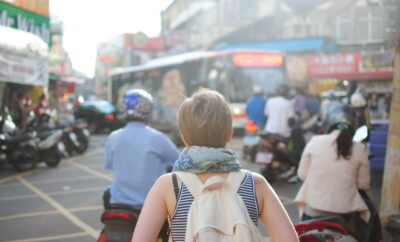
Insights + interviews
Travel safe this festive season with good eye care
As the festive season comes around, we find ourselves moving away from our usual daily routines. Taking good care of our eyes is important, and understanding how the different environments contributes towards eye care conditions is crucial.
Air travel is a key culprit when it comes to subjecting our airs to dry and tiring conditions, because of a long-haul flight, or the low humidity. These factors can lead to discomfort with your eyes, mouth, nose, and skin.
Depending on where we travel to, another commonly overlooked action is to bring or carry a pair of sunglasses. Damage to the eyes from UV rays can take place regardless of being in a summer or winter country. For example, light reflected off snowy terrain makes it even more crucial to wear appropriate sunglasses during the winter season.
We share some learning and tips from Dr James Pan, Senior Consultant Ophthalmologist, Nobel Eye and Vision Centre, Healthway Medical about looking after our eyes when we travel.
the Active Age (AA): Why does air travel put pressure on the eyes?
Dr. James Pan (JP): Air travel is notorious for putting our eyes through extra dry and tiring conditions, giving rise to the commonly used term for overnight flights – the “red-eye”.
The low humidity in airplanes causes discomfort in sensitive areas like your eyes, mouth, nose, and skin. According to the World Health Organisation, humidity in aircraft cabins is usually less than 20%. This is a significant decrease from the average humidity in Singapore, which hovers around 80%. As such, dry eyes are a common condition experienced by travellers.
AA: What are some tips to avoid eyes issues during and after a flight? JP: Here are some tips to avoid eyes issues during your flight:
- Remove your contact lenses when flying: Even under normal conditions, contact lenses increase the possibility of experiencing dry eyes. Switching to a pair of glasses during the flight will reduce this risk, and provide more comfort for your eyes during the journey
- Wear an eye mask: If you are planning to take a nap, wearing an eye mask will help you get better rest by increasing darkness and keeping any dust and debris from accumulating near your eyes. This ensures that once you will not accidentally rub any foreign material into your eyes once you wake up
- Use eye drops: Consider increasing your use of eye drops during and after the flight to help prevent the build-up of foreign material or any dryness that can cause eye irritation. This applies whether you are a contact lens user or not. If you suffer from dry eyes on a regular basis, consult your eye care professional before travelling as you might need a more effective, long-lasting lubricant to keep with you on the flight.
- Stay hydrated: A dehydrated body can result in dry eyes. Keep yourself hydrated by taking in plenty of fluids before, during and after the flight. This is especially important if you are planning to have an alcoholic drink or other caffeinated beverages on the plane, which would dehydrate you further. After the flight, continue to lubricate your eyes to keep them moist and free of foreign particles, and remember to drink plenty of fluids to replenish your body after the dry in-flight conditions. If you continue to experience dry eyes or other eye symptoms after your flight, visit an eye care specialist to get it examined.
AA: What advice would you have for travellers with existing eye conditions?
JP: If you have a pre-existing eye condition such as dry eyes, consider scheduling a visit with your eye doctor to recommend a specific type of eye drops to ensure that this will not be an issue on your trip.
This applies to contact lens users as well. For those with chronic eye diseases such as glaucoma or allergic eye diseases, it is prudent to bring along enough eye drops with you on your trip. Bringing along a doctor’s memo indicating your diagnosis and the type of medications you need is also useful if urgent medical attention is needed overseas.
If you have recently undergone eye surgery, check with your ophthalmologist if there are any special precautions that you should take on your holiday.
For example, those who have undergone recent cataract surgery or Lasik surgery should refrain from water sports a month after the procedure.
Whether or not you have an existing eye condition, you should already be practicing some general care habits to care for our eyes during holidays. This includes:
- Wearing proper protective eyewear: A fashionable pair of sunglasses is good for more than just looking good. Sunglasses are vital to shield your eyes from the harmful effects of the sun’s UV rays. Excessive UV exposure can cause early cataract formation, age-related macular degeneration (deterioration of the retina) and pterygium. To protect your eyes from harmful solar radiation, sunglasses should have both UVA and UVB protection, the two different types of ultraviolet waves that require different defenses. (UVA rays will progress signs and conditions of aging, while UVB rays can cause cancer.)
- Don’t stare directly at the sun: Contrary to what advocates for staring at the sun are saying, sun gazing or staring directly at the sun or other types of bright lights will cause its UV lights to flood your retina. When the light-sensing cells of the retina are overstimulated, they release a flood of signaling chemicals. In sufficient concentrations, like during a long look at the sun, these can damage to surrounding tissue. Short-term damage can include sunburn of the cornea, known as solar keratitis. This results in light sensitivity and pain, with symptoms generally showing up within 24 hours of exposure.
- Maintain a proper diet: The holidays may call for a more adventurous diet, but it is important to remember that good eye health starts with a good diet. Nutrients such as omega-3 fatty acids, zinc, and vitamins C and E help ward off age-related vision problems like macular degeneration. You can get these nutrients by filling your plate with green leafy vegetable such as spinach, kale, fishes such as salmon and tuna, as well as eggs, nuts and beans.
AA: What advice would you give for contact lens use during travel?
JP: Go for an eye check a few weeks before travelling to ensure that your contact lens prescriptions are up to date. Aside from bringing a pair of glasses with you, remember to also bring an extra contact lens cases, spare contacts and any other eye care supplies you need on your trip.
It may also be tempting to purchase contacts during your travels, especially when they may be sold at the fraction of the price of your usual contacts.
However, keep in mind never to purchase contacts unless they’ve been prescribed for you as wearing non-prescribed contacts may harm your vision.
Lastly, no matter where you are traveling, be sure to wash your hands thoroughly with soap and water before touching your contact lenses or your eyes.
Article and tips contributed by Dr James Pan, Senior Consultant Ophthalmologist, Nobel Eye and Vision Centre, Healthway Medical









